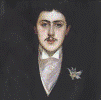Modern Languages and Literatures, Department of

French Language and Literature Papers
Document Type
Article
Date of this Version
September 1996
Abstract
Bertrand Marchal’s welcome new edition of Mallarmé’s early correspondence will surely invite a fresh look at the often subtle intersections between text and hors-texte. The question is an engaging one not only because of Mallarmé’s own pronouncements questioning the mimetic function of literary language but because the oblique referentiality that does occur, sometimes in spite of the poet's overt intentions, points to unexpected structures of thought. I have shown elsewhere how these are at work in the verse, where Mallarmé’s cherished notions of friendship among poets and ideal readership play upon his use of the muse figure. A somewhat different though equally fruitful place of enquiry are Mallarmé’s essays of the 1880s and ‘90s, what he called his “poèmes critiques,” which have as their subject the necessity of forging a new language. These pieces are written in Mallarmé’s late hermetic prose style and so are examples of that new language. The grand synthesis of Mallarmé’s thinking along these lines is in La Musique et les Lettres, delivered in 1894 as an invited lecture at Oxford and Cambridge Universities, later published in England in a volume of the Taylorian lectures, but appearing in France with some modifications in the Figaro and the Revue Blanche soon after Mallarmé’s return from the tour (O.C. 1607). Mallarmé’s idea, here as elsewhere, is to lay the ground for a universal poetic language, that is to say a supra-national poetics for all language(s). Thus the relationship is only indirect with other, more literal internationalist activity such as the Esperanto movement; while universalism is implied in Mallarmé’s essay, no specific human language (other than French!) is ever mentioned. As will be discussed below, this suggestive expression of 19th century international political utopianism stems in fact from the poet’s own foray into political activism in the early 1870s. Moreover, the surprising mix of politics and poetics informs the inception of the Symbolist movement around 1876, at least as understood by Mallarmé who would become its chef d’école.


Comments
Published in Kaleidoscopes: Essays in Nineteenth-Century French Literature in Honor of Thomas H. Goetz. Edited by Graham Falconer and Mary Donaldson-Evans. Toronto: Centre d’Études Romantiques Joseph Sablé, 1996. Pp. 157-168. Copyright © 1996 Centre d’Études Romantiques Joseph Sablé. Used by permission.
http://www.chass.utoronto.ca/french/sable/